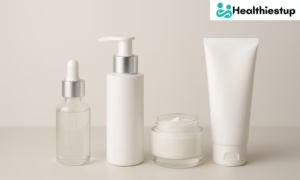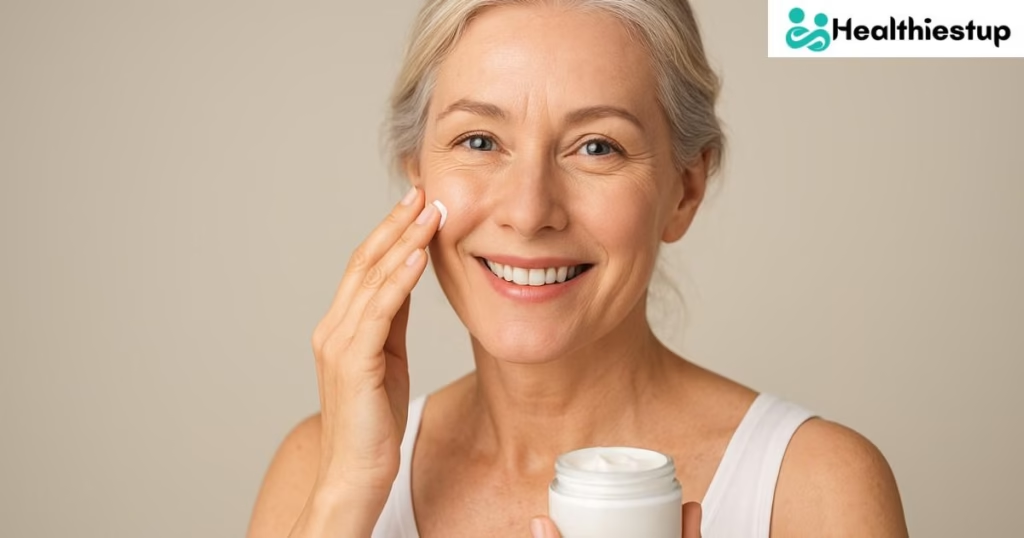Introduction
Anti-Aging Skin Care: Aging is a natural process one that every person experiences but how your skin ages depends greatly on your lifestyle, environment, and skincare habits. Fine lines, wrinkles, age spots, and a loss of elasticity may seem inevitable, but modern skincare science offers proven ways to slow down these visible signs of aging. With the right products, consistent routines, and a holistic approach, your skin can remain radiant, smooth, and youthful well into your later years.
This in-depth guide explores the science of aging, key ingredients that combat skin aging, dermatologist-approved skincare routines, and the best products that deliver visible results.
Understanding the Science Behind Skin Aging
Anti-Aging Skin Care: To care for aging skin effectively, it’s crucial to understand what causes these changes. The skin is made up of three layers: the epidermis (outer layer), dermis (middle layer), and subcutaneous tissue (deepest layer). As we age, the dermis starts to produce less collagen and elastin — proteins responsible for keeping the skin firm and elastic.
Moreover, the skin’s ability to retain moisture declines, leading to dryness and a rough texture. Cell renewal also slows down, making the skin look dull and uneven. The cumulative effect of these changes results in wrinkles, sagging, and other age-related signs.
Aging can be classified into two main types:
-
Intrinsic Aging (Natural Aging): This is the slow, genetic aging process that happens with time. It involves a gradual reduction in collagen, elasticity, and skin cell turnover.
-
Extrinsic Aging (Environmental Aging): Caused by external factors like sun exposure, pollution, smoking, poor diet, and stress. These factors accelerate visible aging signs and make the skin appear older than its biological age.
While you cannot stop intrinsic aging, you can control extrinsic aging through proper skincare, sun protection, and a healthy lifestyle.
Essential Anti-Aging Ingredients Backed by Science
Anti-Aging Skin Care: Dermatologists worldwide emphasize that effective anti-aging skin care depends on using scientifically proven ingredients. Here are the most powerful and well-researched components to include in your regimen:
1. Retinol (Vitamin A Derivatives)
Anti-Aging Skin Care: Retinol is considered the gold standard in anti-aging skin care. It increases skin cell turnover, stimulates collagen production, and minimizes fine lines, wrinkles, and pigmentation. Consistent use of retinol can also smooth uneven texture and refine pores.
Tip: Start with a lower concentration (0.25%–0.5%) if you are new to retinol and apply it only at night, followed by a moisturizer to prevent irritation.
2. Vitamin C (Ascorbic Acid)
Anti-Aging Skin Care: A potent antioxidant, Vitamin C protects your skin from free radicals caused by UV exposure and pollution. It also brightens the skin tone, reduces dark spots, and enhances collagen synthesis for firmer skin.
Tip: Apply Vitamin C serum every morning before sunscreen for maximum protection and glow.
3. Hyaluronic Acid
Anti-Aging Skin Care: Hyaluronic acid is a moisture magnet it holds up to 1,000 times its weight in water. It keeps the skin hydrated, plump, and supple, minimizing the appearance of fine lines.
Tip: Look for products that combine hyaluronic acid with ceramides for long-lasting hydration.
4. Peptides
Anti-Aging Skin Care: Peptides are amino acids that help rebuild damaged skin cells and promote collagen and elastin production. They improve firmness and texture, making skin appear smoother and more lifted.
5. Niacinamide (Vitamin B3)
Anti-Aging Skin Care: This multitasking ingredient strengthens the skin barrier, improves elasticity, evens out skin tone, and reduces redness. It’s gentle enough for all skin types, including sensitive skin.
6. Sunscreen (SPF 30 or Higher)
Anti-Aging Skin Care: Sun exposure is responsible for up to 90% of visible skin aging. UV rays cause collagen breakdown, pigmentation, and loss of elasticity. Daily sunscreen use rain or shine is the most effective anti-aging step you can take.
How to Build an Effective Anti-Aging Skin Care Routine
Anti-Aging Skin Care: A structured skincare routine is essential for maintaining youthful skin. The right combination of products at the right time can protect, nourish, and rejuvenate your skin.
Morning Routine
-
Cleanser: Start with a gentle, hydrating cleanser to remove overnight impurities and excess oil. Avoid harsh soaps that strip the skin of natural moisture.
-
Recommended: CeraVe Hydrating Facial Cleanser or La Roche-Posay Toleriane Hydrating Cleanser.
-
-
Antioxidant Serum: Apply a Vitamin C serum to protect against environmental stressors and brighten your complexion.
-
Recommended: La Roche-Posay Pure Vitamin C10 Serum or SkinCeuticals C E Ferulic.
-
-
Moisturizer: Choose a lightweight moisturizer that locks in hydration without feeling greasy.
-
Recommended: Neutrogena Hydro Boost Water Gel or Olay Regenerist Whip Moisturizer.
-
-
Sunscreen: Always finish your morning routine with a broad-spectrum SPF 30 or higher.
-
Recommended: EltaMD UV Clear Broad-Spectrum SPF 46 or Neutrogena Ultra Sheer Dry-Touch SPF 55.
-
Evening Routine
-
Cleanser: Remove makeup, dirt, and sunscreen with a gentle but effective cleanser or micellar water.
-
Recommended: Bioderma Sensibio H2O Micellar Water.
-
-
Treatment: Apply your anti-aging active — retinol, peptides, or niacinamide — depending on your skin’s tolerance.
-
Recommended: CeraVe Skin Renewing Retinol Serum or The Ordinary Buffet + Copper Peptides.
-
-
Night Cream: End your routine with a nourishing moisturizer to repair the skin overnight.
-
Recommended: Olay Regenerist Micro-Sculpting Cream or CeraVe PM Facial Moisturizing Lotion.
-
Best Dermatologist-Recommended Anti-Aging Products
1. CeraVe Skin Renewing Retinol Serum
This serum combines retinol with ceramides and hyaluronic acid to refine texture and improve skin tone while strengthening the skin barrier.
2. Olay Regenerist Micro-Sculpting Cream
Rich in peptides and niacinamide, this cream deeply hydrates and firms the skin, reducing fine lines within weeks.
3. La Roche-Posay Hyalu B5 Serum
A combination of hyaluronic acid and Vitamin B5 that plumps and repairs skin, restoring its natural bounce and radiance.
4. Neutrogena Rapid Wrinkle Repair Night Moisturizer
With retinol SA and hyaluronic acid, it visibly smooths wrinkles and enhances skin texture in just one week of use.
5. The Ordinary Buffet + Copper Peptides 1%
Targets multiple signs of aging with peptides, amino acids, and hyaluronic acid at an affordable price.
6. EltaMD UV Clear Broad-Spectrum SPF 46
A lightweight sunscreen enriched with niacinamide that protects against UVA and UVB rays while soothing sensitive skin.

Lifestyle Habits That Slow Down Skin Aging
Anti-Aging Skin Care: Healthy, youthful skin is not achieved by skincare alone. Your daily habits play an equally vital role in maintaining skin vitality.
1. Protect Against Sun Damage
UV rays accelerate aging by breaking down collagen and elastin. Wear sunscreen daily, and complement it with hats and sunglasses during outdoor activities.
2. Stay Hydrated
Drink at least 8 glasses of water daily. Proper hydration helps maintain elasticity and supports the body’s natural detoxification process.
3. Eat an Antioxidant-Rich Diet
Foods high in antioxidants like berries, leafy greens, nuts, and fish fight free radicals that cause cellular damage. Omega-3 fatty acids found in salmon and flaxseeds also keep skin supple.
4. Get Adequate Sleep
During deep sleep, your body produces collagen and repairs skin cells. Aim for 7–8 hours of uninterrupted sleep to prevent dull, tired-looking skin.
5. Avoid Smoking and Limit Alcohol
Nicotine constricts blood vessels, reducing oxygen flow to the skin, while alcohol dehydrates and inflames the skin. Both contribute to premature wrinkles.
6. Manage Stress
Chronic stress increases cortisol levels, which break down collagen and disrupt the skin’s natural balance. Practice mindfulness, yoga, or meditation daily.
Professional Anti-Aging Treatments to Enhance Results
Anti-Aging Skin Care: Sometimes, over-the-counter products aren’t enough to address deeper wrinkles or skin laxity. Dermatologists recommend several professional treatments to complement your skincare routine:
- Chemical Peels: Remove dead cells and stimulate new skin growth for smoother texture and even tone.
- Microneedling: Promotes collagen production through micro-injuries that trigger skin repair.
- Laser Therapy: Targets wrinkles, pigmentation, and redness for more youthful-looking skin.
- Botox and Dermal Fillers: Temporarily smooth out wrinkles and restore facial volume.
Always consult a board-certified dermatologist to choose the safest and most effective treatment for your skin type.
Long-Term Anti-Aging Strategy
Anti-aging skin care is not a short-term fix but a lifelong commitment. Consistency and patience are key. Here’s how to ensure lasting results:
- Follow a daily skincare routine — morning and night without skipping sunscreen.
- Introduce actives slowly to prevent irritation.
- Exfoliate once or twice a week to remove dead cells and enhance absorption.
- Stay consistent for at least 8–12 weeks before judging product effectiveness.
- Revisit your skincare routine every few months to adjust to your skin’s changing needs.
Conclusion
Anti-Aging Skin Care: Aging gracefully is about embracing your skin at every stage while giving it the care it deserves. With the right balance of effective ingredients like retinol, Vitamin C, and hyaluronic acid along with sunscreen, hydration, and a healthy lifestyle you can maintain a youthful, glowing complexion for years to come.
Remember, the goal of anti-aging skincare isn’t to reverse time but to enhance your skin’s natural beauty, resilience, and health. Prevention, protection, and consistency are your strongest allies in achieving timeless, radiant skin.
FAQs
Q1: When should I start an anti-aging skin care routine?
Most dermatologists recommend starting in your mid-to-late 20s when collagen production begins to decline.
Q2: Can I use retinol and Vitamin C together?
It’s best to use Vitamin C in the morning and retinol at night to prevent irritation and maximize benefits.
Q3: What’s the fastest way to reduce wrinkles?
Consistent sunscreen use, retinol application, and hydration can visibly reduce wrinkles within a few months.
Q4: How long does it take for anti-aging products to work?
You may start seeing results within 8–12 weeks of consistent use, depending on the ingredients.
Q5: What’s the best anti-aging treatment for sensitive skin?
Niacinamide and peptides are gentle yet effective for sensitive or reactive skin types.



